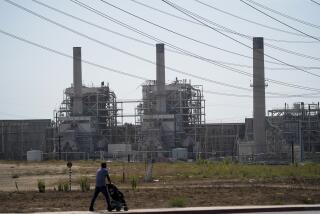U.S. Probes Alleged Pact Not to Build New Plants
- Share via
The U.S. Department of Justice has launched an investigation into whether two companies that control a large swath of Southern California’s electricity supply agreed to limit power plant construction, potentially hindering crucial energy production, according to federal records and interviews.
The civil antitrust probe of Williams Energy Services and AES Southland represents the Justice Department’s first foray into the activities of energy suppliers who have reaped huge profits in California’s price-shocked market.
AES disclosed the investigation, which began last month, in a filing with the Securities and Exchange Commission on Tuesday. In its papers, AES said the Justice Department is focusing on whether its agreement with Williams could constrain future power plant construction in Southern California.
The investigation comes at a time when the state is scrambling to get new generators built and running to avoid blackouts and economic problems.
The government alleges that AES and Williams agreed to limit the expansion or construction of new power plants near three facilities purchased by AES in 1998 from Southern California Edison under the state’s new deregulation plan.
The plants--in Long Beach, Huntington Beach and Redondo Beach--are owned by AES, but the electricity is sold by Williams. Under a 3-year-old deal, known as a tolling agreement, Williams essentially rents out the capacity of the plants for annual payments to AES. Williams supplies natural gas to fire the plants and sells the electricity under long-term contracts and in the costly spot market.
Williams and AES have similar tolling agreements at plants in Pennsylvania and New Jersey. However, AES spokesman Aaron Thomas said the Justice Department’s investigative requests have focused only on agreements between Williams and AES in Southern California.
Thomas would say only that the agreement at the center of the investigation is simply a delineation of “how expansion or repowerings are done at the facilities.”
The three plants have a combined capacity of more than 3,900 megawatts, enough to supply about 3 million homes. This summer, AES is bringing another 450 megawatts on line by reactivating two mothballed generators in Huntington Beach.
Paula Hall-Collins, a spokeswoman for Tulsa-based Williams Cos., said she believes that the investigation is unrelated to a recent inquiry by the Federal Energy Regulatory Commission into whether AES and Williams unnecessarily shut down plants to jack up prices. A portion of that investigation was settled in April, when Williams, without admitting any wrongdoing, agreed to pay about $8 million.
“We’ve always maintained that we’ve operated within the law, and we’re certain the investigation by the DOJ will find we are operating legally,” Hall-Collins said.
Williams and AES are among the power plant owners and marketers that have been lambasted by Gov. Gray Davis because of gold-plated electricity prices that have pushed the state’s biggest utilities to the edge of ruin and are steadily draining the state’s budget surplus.
State officials are asking FERC to revoke the rights of AES and Williams to sell electricity at whatever price the market will bear. That right was granted for three years, beginning in 1998 by federal regulators when California’s $28-billion electricity market was opened to competition.
Under that plan, the rights of AES and Williams to sell into the market are the first to come up for renewal.
AES Southland and Williams Energy Services are both arms of large energy companies--AES Corp. of Arlington, Va., and Williams Cos. of Tulsa, Okla.
More to Read
Inside the business of entertainment
The Wide Shot brings you news, analysis and insights on everything from streaming wars to production — and what it all means for the future.
You may occasionally receive promotional content from the Los Angeles Times.










